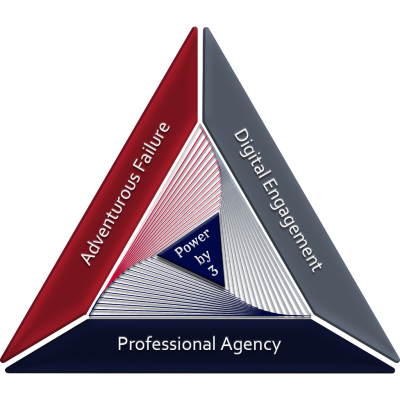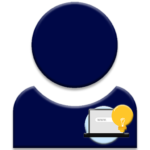
Power by 3 empowers educators to make decisions that break the culture of disenfranchisement and allows them to reclaim their professionalism.
The purpose of Power by 3 is to challenge assumptions perpetuated by a flawed education system and provide a pathway for educators to become transformative in their practice, despite living in an age of compliance. This purpose assumes three connected essential powers for educators to fulfill their calling: professional agency, adventurous failure, and digital engagement.

I set out to create a symbol–a brand, as it is called–that represented my new website, and the three powers I hope to promote for educators. I couldn’t think of a better way to express self-sustaining power than an equilateral triangle: three powers by three sides, all equal and balanced.
Visually, the triangle can land on any of the three sides and still sustain the balance. What matters is how you see the triangle. What is your main power? Which two keep it in balance? Regardless of the answer you give yourself, this website is about keep and maintaining all three.
Educators build this world, serve up eternity, and affect the future.

Professional Agency
The power of professional agency is in educators’ ability to make purposeful decisions in their classrooms, not have them be dictated by standardization. Educators with agency emancipate themselves and their students from the drudgery of skills-based, prescriptive teaching, and instead, inform their teaching from relevant classroom data that genuinely addresses student needs.
Power by 3 provides educators with ideas on how to reclaim their personal power to address the needs of their learners at a time when school culture is more concerned with compliance.

Adventurous Failure
The power to promote adventurous failure stems from the belief that learning for both the educator and the student is a problem-solving process with multiple pathways to failure that ultimately lead to joyful learning. This is the power to create safe communities that do not teach shame but rather, ways to accept failure as part of the learning adventure. Learning through problem solving and critical and creative thinking rely on failure as a path to success.
Power by 3 provides educators with ideas on how to create a community of learners that embrace adventurous failure.

Digital Engagement
The power of digital engagement stems from an educator’s belief that digital tools can be open avenues for tolerance of human diversity and catalysts for solving real world problems. Educators who believe in digital engagement recognize that digital tools are not a substitute for building deep personal relationships with students and understanding their learning needs.
Power by 3 provides educators with ideas on how to engage students with digital tools that support collaboration, and inquiry and discovery learning within a learner-centered pedagogy.
Bibliography
The power by 3 philosophy has been influenced by my 25 years of teaching experience, as well as the following works of other inspiring individuals. This list is organic, and will continue to grow I discover new books and resources, or as new ones are published.
Couros, G. (2015). The Innovator’s Mindset: Empower Learning, Unleash Talent, and Lead a Culture of Creativity. San Diego, CA. Dave Burgess Consulting, Inc.
Hooks, B. (1994). Teaching to Transgress: Education as the Practice of Freedom. New York: Routledge.
Klein, A. (2018). Pushback on Standardized Testing Loses Momentum: ESSA, competing priorities put damper on movement. Education Week, 38(1), 22–23. Retrieved from http://ezhost.utrgv.edu:2048/login?url=http://search.ebscohost.com/login.aspx?direct=true&db=eft&AN=131843800&site=ehost-live
Martin, K. (2018). Learner Centered Innovation: Spark Curiosity, Ignite Passion and Unleash Genius. San Diego, CA: IMPress Books.
Morris, S. M. and Stommel, J. (2018). An Urgency of Teachers: The Work of Critical Digital Pedagogy. Hybrid Pedagogy, Inc.
Ostorga, A. N. (2018). The Right to Teach: Creating Spaces for Teacher Agency. Lanham, MD: Rowman & Littlefield Publishers.
